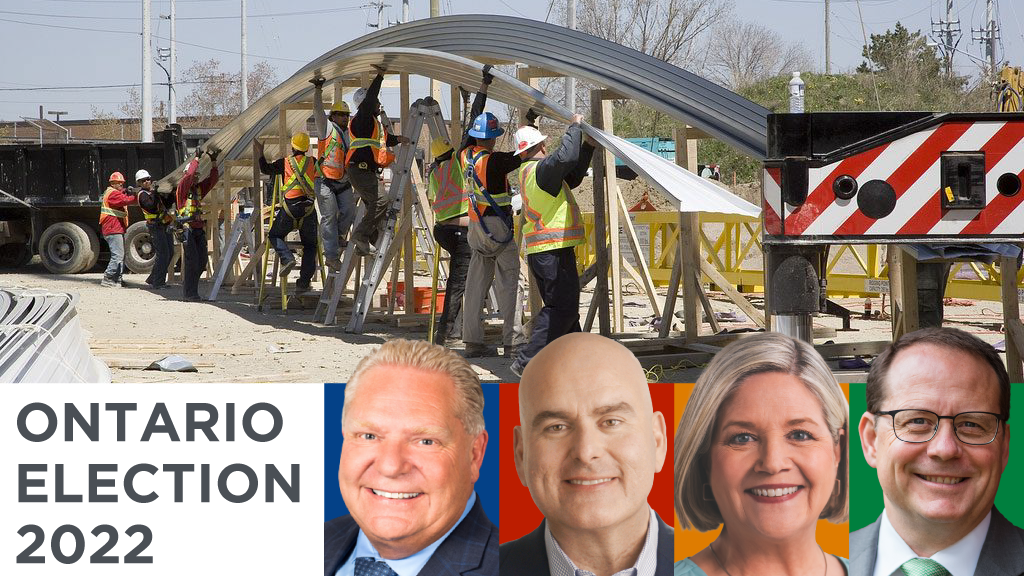With the Ontario election less than a week away, the Daily Commercial News wanted to reach out to industry leaders to get their “wishlist” of issues and items they feel should take centre stage for whomever forms the next government. Here is the final part of our series, which takes a look at the skilled labour shortage in the province.
Leaders vying for the top spot as Ontario’s next premier have been making infrastructure commitments as part of their campaign promises, but those in the construction industry say it’s critical there’s skilled workers to complete these projects.
“Top of mind for everybody in the industry is obviously access to workers,” said Karen Renkema, vice-president for Ontario with the Progressive Contractors Association of Canada (PCA).
“It’s a perfect storm with people leaving the industry because of the pandemic, the amount of infrastructure investment that is coming to a head right now because we’re rolling at full steam, the number of workers required to do that infrastructure work as well as the retirement in the industry.”
PCA’s members are saying they need workers now and, at the same time, are wondering how they are going to grow the next generation of tradespeople.
Although the different parties have been discussing a number of infrastructure and construction-related issues, the labour shortage doesn’t seem to be one of them.
“Nobody is actually getting to the real crux of the issue. Without a workforce willing to build things and be able to help the province’s economic future we are going to be stuck with continued inflationary measures,” Renkema said. “We can do as much as we want to interest rates but if there aren’t workers available we’re going to still be in a situation of where projects are going to cost a lot more, houses are going to cost a lot more.”
The only party that’s really talked about skilled trades or labour supply type issues in any detail is the PCs, she added.
Marc Arsenault, business manager and secretary treasurer of the Provincial Building and Construction Trades Council of Ontario, said the council submitted its priorities to the four parties which include recognizing that the construction industry needs to prepare itself and plan ahead with a post-pandemic economic recovery strategy.
“We discussed how we could assist with providing a construction industry advisory panel to capture the civil and mechanical and electrical trades and their training capacity, the labour demand forecast and assist with identifying bottlenecks and discussions on ways to relieve and mitigate those risks and as well provide project stability,” Arsenault told the Daily Commercial News.
Patrick McManus, chair of the Ontario Skilled Trades Alliance, said in the last four years good progress has been made with respect to regulatory reform.
“Now we need to take those next steps,” McManus said. “We need to focus on pinpointing what are the in-demand trades and, in particular, we believe that we need to be promoting and training voluntary trades. This is where we are seeing some of the most significant growth in need for the projects, especially for the housing and civil construction work that’s going on.”
Ian Cunningham, president of the Council of Ontario Construction Associations, said COCA would like to see a review of the Construction Act as recommended by Bruce Reynolds and Sharon Vogel in their report Striking the Balance that led to the creation of the act.
COCA would also like the government to strengthen the province’s workers’ compensation system by transferring ministerial oversight for the Workplace Safety and Insurance Board from the Minister of Labour Training and Skills Development (MLTSD) to the Ministry of Finance “which is much better equipped with the financial and mathematical skills and understandings to oversee a large and complex insurance system,” explained Cunningham.
The Ontario General Contractors Association’s (OGCA) strategy throughout the election campaign has been to provide information to members to make an informed decision.
“When the next provincial government is elected and gets to work the first thing we’re obviously looking for is co-operation and engagement directly with the industry and with industry associations,” said Erich Schmidt, manager of public affairs and innovation.
“Something else we would like to see is co-operation in terms of the approval of important projects between federal, provincial and municipal governments, to provide greater clarity in terms of what these projects look like and to try to get them off the ground faster.”
OGCA would also like to see continued investment in infrastructure.
“I think we’ve seen across all the major parties that they are committing to significant investments in critical ICI projects, whether it be schools, hospitals, roads. This is important for us to continue to maintain that level of investment and maintain investment in our critical ICI infrastructure,” said Schmidt.
“Investment in the skilled trades is critical. We have a looming skills deficit in this province and we need to maintain that investment and even double down on our efforts in order to address it. Something we’ve been working on and also focusing on is not just the classic skilled trades but also looking at project managers and other critical site staff, health and safety staff as well to ensure there is also an ample supply of that labour in the market.”
For more on these interviews, check out part one of The Construction Record podcast today.
Follow the author on Twitter @DCN_Angela.











Recent Comments
comments for this post are closed